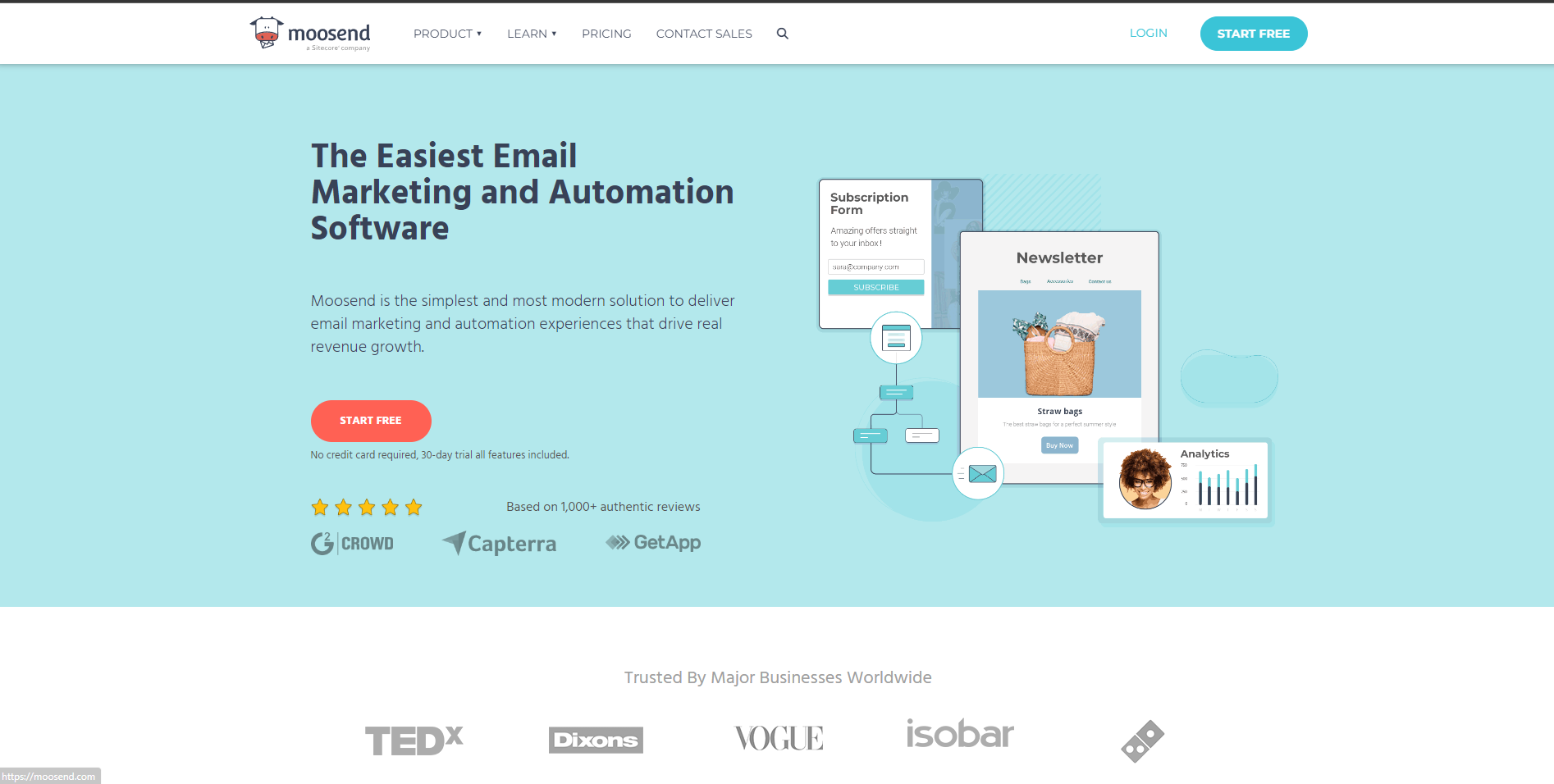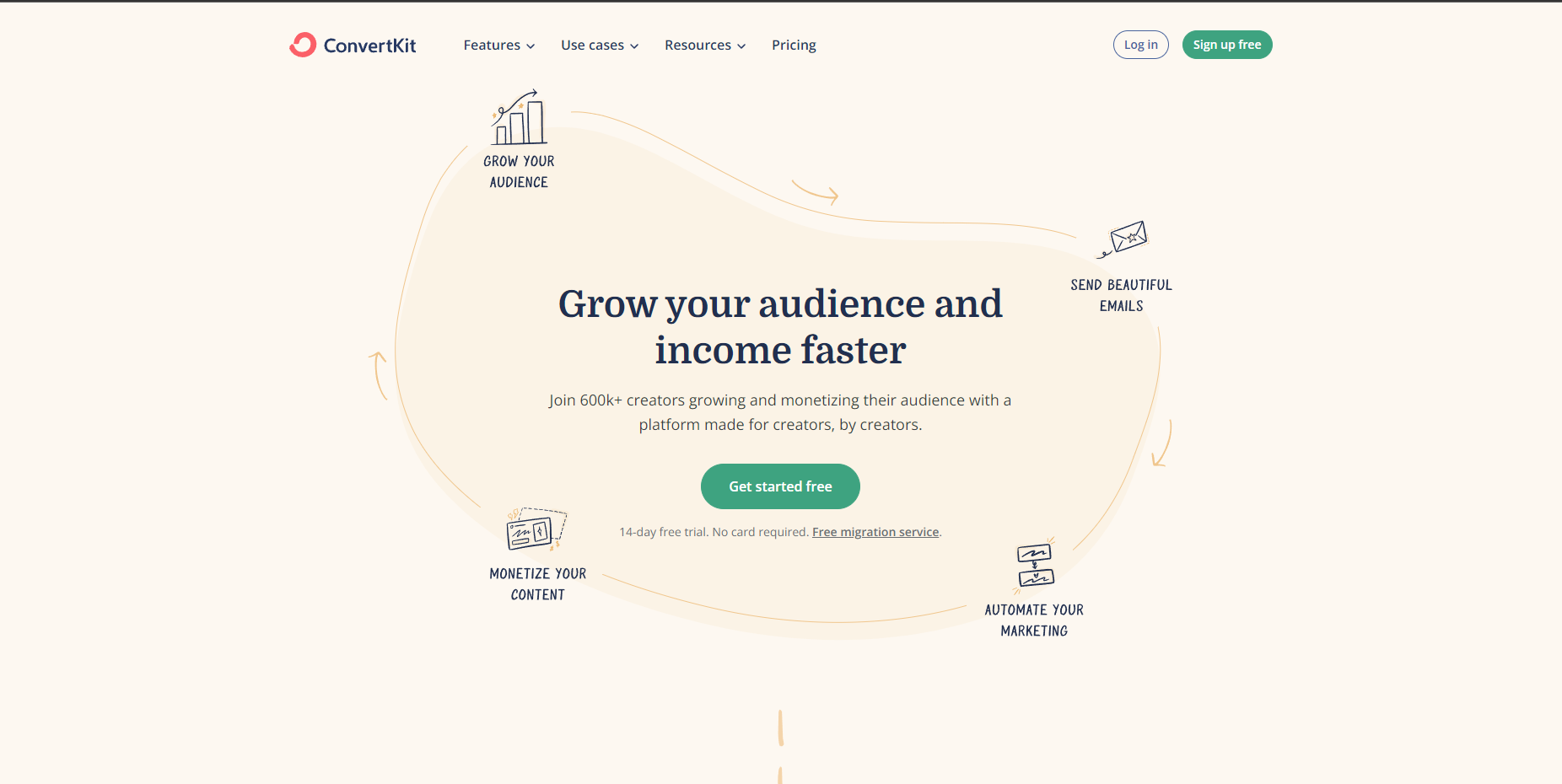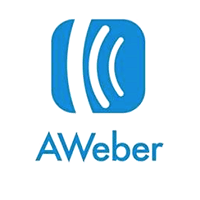Constant Contact is one of the most well-known email marketing platforms, used by over 600,000 small businesses to create, send, and track email campaigns. The simple drag-and-drop editor makes it easy for novices to build professional-looking emails. However, some users eventually outgrow what Constant Contact offers or find themselves wanting more advanced features.
Additionally, Constant Contact lacks robust automation and segmentation functionality compared to competitors, frustrating power users. Over time, some customers also run into deliverability issues like blocked or spam-marked emails which hurt their sender’s reputation. Find out more in this article on the best Constant Contact alternatives.
Brevo
If you're looking for the best all-in-one email marketing platform and the best Constant Contact alternative, Brevo is for you.
Omnisend
Omnisend is the ideal choice if you own a Shopify store and want to expand your customers base with email campaigns.
HubSpot
HubSpot is reliable, flexible, and can be used in a wide range of email marketing activities - perfect for all sorts of strategies.
ActiveCampaign
ActiveCampaign offers some of the most powerful and effective automation capabilities out of all email marketing tools.
AWeber
If you want to build your email lists with ease, utilizing some of the best list-building features in the industry, choose AWeber
1. Brevo
Best Overall Constant Contact Alternative (Free, then $25/Month)
Brevo is a cloud-based email marketing platform built specifically to support high-volume email programs. With a focus on deliverability, automation, and integration, Brevo aims to help e-commerce companies scale customer communications as they grow.
Some key capabilities include behavioral automation based on customer actions, 1:1 personalization using customer data, email list segmentation, A/B testing, drag-and-drop templates, and analytics dashboards.
Brevo also offers extensive e-commerce integrations as well as CRM and marketing automation connectivity.
What makes Brevo a better alternative:
- Advanced deliverability features like IP warming, domain authentication, and inbox placement testing help avoid spam filters and blacklists.
- Granular segmentation and custom field creation allow you to personalize and target groups effectively from your CRM data.
- The platform is purpose-built for e-commerce rather than a one-size-fits-all approach, with deep Shopify and other commerce engine integrations.
- Brevo guarantees 100% uptime and faster performance as a cloud-based SaaS compared to installed software options.
- It’s one of the best free Constant Contact alternatives. Pricing is transparent and competitive – plans start free for up to 25K subscribers then just $99/month for up to 150K subscribers.
By focusing specifically on growing e-commerce brands and high-volume email delivery, Brevo offers a more reliable and scalable solution compared to general email platforms. Advanced automation and customization take your marketing to the next level.
2. Omnisend
Best for Shopify-Powered Stores (Free, then $16/Month)
Omnisend is an e-commerce email and SMS marketing platform built for Shopify stores specifically. It seamlessly integrates customer data from Shopify to trigger behavioral automation and personalized messaging.
With pre-designed templates for common e-commerce scenarios like abandoned carts or post-purchase follow-ups, Omnisend aims to save online businesses time while driving more sales. The platform also includes subject line testing, customer analytics based on clicks and conversions, and advanced list segmentation capabilities.
What makes Omnisend a better alternative:
- As a Shopify-only platform, the integration is extremely deep to access all customer data and behavior signals from your store.
- Pre-made automation workflows and templates are tailored to e-commerce scenarios, requiring no technical skills.
- Advanced behavioral targeting options are available, such as cart abandonment sequencing or cross-sell recommendations.
- Omnisend guarantees the highest email deliverability in the industry by managing your sending domain and infrastructure.
- Starting at just $9/month, the pricing is very competitive, especially considering the extent of features specialized for Shopify.
With a Shopify-first approach, robust e-commerce-focused templates and automation, and strong deliverability guarantees, Omnisend best serves growing Shopify merchants compared to more generalized platforms.
3. HubSpot
Best for SMBs Seeking an All-in-One Marketing Platform (Free, then $20/Month)
HubSpot aims to be an integrated inbound marketing, sales, and service software suite for small and mid-sized businesses. The platform includes email and landing page builders, blogging, popups, and website tracking.
For email specifically, HubSpot enables easy creation and sending of campaigns, templates, automation-based on-site visits, and integration of email contacts into your centralized CRM system. Reports provide data like open, click-through, and unsubscribe rates.
What makes HubSpot a better alternative:
- The end-to-end platform also covers crucial inbound tools like SEO, blogging, workflows, and analytics under one umbrella.
- Email deliverability is reliable through dedicated IP addresses and analytics on sender score.
- As one of the pioneers of inbound methodology, HubSpot offers proven templates and workflows for lead nurturing tactics.
- The CRM and sales tools empower deeper personalization and sequencing powered by a complete view of each contact.
- HubSpot Academy provides free inbound marketing education and certification courses for users.
For growing companies taking an inbound approach across marketing, sales, and service, HubSpot provides an integrated suite with robust email capabilities compared to a standalone tool like Constant Contact.
4. ActiveCampaign
Best for Marketing Automation Capabilities ($29/Month)
ActiveCampaign is marketed as an all-in-one customer experience platform combining email marketing, automation, CRM, and sales funnel functionality.
For email, it offers a drag-and-drop builder, segmentation tools, A/B testing, content personalization with dynamic fields, and integration of subscriber data with other channels like chat or text messaging. Automation workflows can trigger emails based on time or subscriber actions.
What makes ActiveCampaign a better alternative:
- Robust marketing automation allows you to create complex sequences and conditional rules without coding skills needed.
- Site tracking for subscribers’ behaviors allows triggering emails based on real-time page visits or custom events.
- CRM functionality has over 50 integrations to centralize data from other business systems for better personalization.
- The platform offers free customized technical migrations for switching providers to onboard contacts and campaign history.
- ActiveCampaign features reliable deliverability including advanced inbox placement testing for every campaign for relevant receivers.
With sophisticated automation backed by behavioral tracking data and strong integrations, ActiveCampaign goes significantly further than basic email tools in supporting cross-channel customer experiences.
5. AWeber
Best For Building Subscriber Lists (Free, then $12.50/Month)
AWeber has been an email marketing and automation provider for over 20 years. Known for making email deliverability a priority, AWeber aims to help small businesses grow and manage their subscriber lists.
Capabilities include customizable sign-up forms, drag-and-drop email editors with templates, segmentation, and basic automation triggered by subscriber actions. Integrations exist for major e-commerce platforms like Shopify and WooCommerce.
What makes AWeber a better alternative:
- As an established industry leader, AWeber offers proven deliverability and a good sender’s reputation for inbox placement.
- The platform makes it easy for beginners to design professional sign-up forms to embed across websites and channels.
- List management functionality like automated welcome messages and RSS-to-email content helps build engagement.
- Accuracy in subscriber tracking ensures contacts aren’t marked incorrectly as spam, protecting your sender score.
- Dedicated IP addresses and domain authentication prevent issues like blacklisting.
With rock-solid reliability that stems from over two decades of being focused on deliverability, AWeber empowers small business owners to safely grow their subscriber lists and networks.
6. MailerLite
Best for Simplicity and Ease of Use (Free, then $10/Month)
MailerLite markets itself as an easy-to-use email marketing solution made for small businesses. It offers basic drag-and-drop editors, subscription forms to embed on websites, and automatic welcome email workflows upon sign-up.
Integrations allow MailerLite to connect with tools like WordPress, Facebook, and other platforms to import contacts and track engagement. The system also provides basic analytics on opens, clicks, and unsubscribes.
What makes MailerLite a better alternative:
- The user interface is clean, simple, and focused on beginners without technical skills or resources.
- Useful welcome automation is built-in for engaging subscribers from day one after sign-up.
- An array of pre-made templates covers typical use cases like promos or newsletters to save time.
- Supports core functionality like sign-up forms, basic segmentation, and process automation flows.
- This affordable Constant Contact alternative offers a free plan for up to 1,000 subscribers, then only $10/month for up to 1,000.
While MailerLite lacks some advanced capabilities, the simplicity and intuitive interface of the email marketing tool provide what most small business owners need for starting email marketing without a steep learning curve. Reliability, deliverability, and ease of use make it a better alternative versus more complex solutions.
The affordability can’t be beaten for new email marketers getting off the ground with building their first subscriber list.
7. Campaigner
Best for High Volume B2C Email Marketing ($59/Month)
Campaigner is one of the most popular email marketing tools out there. The software is branded as an email marketing platform built for high-volume senders, with customers ranging from large enterprises to agencies servicing multiple clients.
It focuses on powering complex, large-scale messaging while ensuring excellent deliverability across subscriber inboxes. Capabilities span segmentation tools, automation through journeys, drag-and-drop builders, advanced analytics through custom reports, and robust API/integrations.
What makes Campaigner a better alternative:
- The system is purpose-built to securely handle billions of monthly emails at scale, far beyond most provider capabilities.
- Granular segmentation functionality makes targeting large audiences with personalized content simple.
- Multi-brand support through sub-accounts meets the needs of agencies managing campaigns across different clients.
- Automation setup allows for the creation of complex sequences with unlimited steps and conditions tailored to each user.
- Dedicated deliverability tools like signal monitoring and blacklist-monitoring pre-sending scans prevent reputation issues.
For established companies already dealing with high email volumes, Campaigner provides enterprise-grade power for scaling deliverability and personalization that surpasses basic small business tools.
8. BigMailer
Best for High-Volume Senders Prioritizing Deliverability (Free, then $5/Month)
BigMailer is yet another one of the leading Constant Contact competitors on this list. The email platform is focused on powering reliable mass email delivery for large businesses, agencies, and bulk senders distributing newsletters.
Its toolbox simplifies building emails, creating sign-up forms, segmenting contacts, and tracking engagement analytics. Robust infrastructure aims to optimize inbox placement and avoid spam triggers across recipients.
What makes BigMailer a better alternative:
- Proprietary delivered tech stacks ensure your sending reputation remains protected when broadcasting at scale.
- Dedicated IP addresses per client prevent sharing issues that commonly blacklist others.
- Advanced email validation and redundant subscriber checks prevent errors that would reduce deliverability.
- Customers can access granular traffic analytics like unique and mobile open rates to fine-tune targeting.
- BigExpert customer success managers provide hands-on onboarding, campaign launches, and optimization coaching.
With a track record of proven results securing deliverability for high-volume emailers, BigMailer offers reliability and support lacking in self-serve mass mailing solutions.
9. Moosend
Best for E-Commerce Email and SMS Marketing (Free 30-Day Trial, then $9/Month)

Moosend is an email and SMS marketing platform built to help e-commerce companies drive more sales. It integrates with mainstream shopping carts like Shopify and WooCommerce.
The toolset enables creating promotional emails using product data, building quizzes, and polls to foster engagement, launching retargeting campaigns for abandoned carts, and personalized push notifications via SMS text messaging.
What makes Moosend a better alternative:
- Pre-built templates and product recommendation emails are tailored to e-commerce conversion use cases out of the box.
- SMS integration widens the reach beyond email to text subscribers about cart reminders, shipping updates, and personalized promos.
- An intuitive drag-and-drop editor makes campaign creation user-friendly for employees without marketing expertise.
- Advanced features include spin-a-wheel popups and hyper-segmentation by criteria like geolocation or purchase history.
- Starter plans are affordable at just $19 a month including many capabilities other vendors charge add-on fees for.
When it comes to the Moosend vs Constant Contact comparison, it’s easy to see that you get excellent value with this software. With email and SMS capabilities purpose-built around converting more e-commerce sales, Moosend delivers superb functionality for online retail brands without high costs or complexity.
10. Sendinblue
Best for Lean Email and SMS Marketing Teams (Free, then $25/Month)
SendinBlue is an all-in-one digital marketing platform built for lean teams who need to do more with less. It brings email and SMS marketing, marketing automation, a landing page builder and CRM under one roof.
The toolset aims to save time while driving conversions by centralizing contacts, syncing data across channels, triggering personalized messaging automatically, and tracking engagement analytics in one dashboard.
What makes SendinBlue a better alternative:
- An integrated suite approach prevents work duplication and errors from too many disjointed systems.
- Intelligent workflows fueled by AI take manual work out of personalization for individuals.
- SMS expands reach beyond email alone allowing increased flexibility.
- Key functionality like unlimited contacts and 300 emails/month is free forever making SendinBlue accessible.
- The platform scales from startups to enterprises supporting teams of all sizes and growth stages.
With unified email, SMS, and marketing automation scaling with your needs, SendinBlue empowers under-resourced teams to cost-effectively drive more personalized conversations.
11. GetResponse
Best for All-in-One Digital Marketing Platform (Free, then $15.60/Month)
GetResponse markets its offering as an all-in-one online marketing software. It combines email marketing automation with landing pages, webinars, and powerful e-commerce functionality.
Core features include sign-up forms for list building, newsletters and campaign creation, basic workflows and segmentation rules, and product recommendation messaging based on past purchase behavior.
What makes GetResponse a better alternative:
- Webinars capability helps nurture leads through gated video content and training.
- Built-in e-commerce functionality aids product companies with reviews, display, and promo management.
- An app center contains hundreds of integrated solutions to expand platform capabilities.
- GetResponse Academy offers free certifications including email marketing courses for users.
- Shared inbox collaboration allows managing campaigns across teams rather than individuals.
GetResponse aims to transcend basic email marketing software with a wider array of lead gen, analytics, and sales tools included out of the box at compelling rates.
The all-in-one approach provides more seamless functionality scaling from startups up through major enterprises.
12. ConvertKit
Best for Creators Building an Audience and Community (Free, then $9/Month)

ConvertKit is on the list of the best constant contact alternatives because it focuses specifically on assisting internet creators, influencers, and bloggers to build their email subscriber list and nurture their audience into a loyal community.
Its features are geared toward podcasters, authors, and video producers who need to create gated content, send newsletters, build sequencing funnels, and ultimately monetize through conversions.
What makes ConvertKit a better alternative:
- Intent-based automation reacts dynamically to user behaviors like visiting key pages on your site.
- Advanced segmentation helps personalize outreach to subscribers who care about certain topics more.
- Multi-user account tiers enable managing publication teams under one workspace for enterprise needs.
- Robust analytics provide insight into audience content preferences to guide monetization.
- Developer APIs allow heavy customization options compared to rigid platforms.
Built for the unique use case of independent online creators establishing their brand, ConvertKit goes significantly further than general email tools in fostering genuine community connections. It’s the cheaper Constant Contact alternative ideal for budget-conscious users.
Features to Consider For a Constant Contact Alternative
1. Ease of Use
Ease of use should be a top consideration when evaluating Constant Contact alternatives to ensure the platform actually gets used by your team to run effective marketing campaigns. If the interface is too complex with steep learning curves, it often gets abandoned without driving value.
Look for intuitive navigation and workflows that allow you to quickly build emails, create sign-up forms, segment contacts, and review campaign analytics. Drag-and-drop editors that mirror common desktop software help marketers get up and running faster.
Things like pre-designed templates, workflow wizards, and clear cues guide users to execution. Robust help centers with searchability optimize self-service for staff.
Prioritizing usability empowers all team members to leverage email marketing to its fullest rather than just a select few power users. This maximizes adoption and makes your investment start paying dividends faster through more widespread application.
2. Design and Customization
Design and customization capabilities should factor into your Constant Contact alternative decision because emails themselves represent your brand. Their look, feel, and formatting leave lasting visual impressions on recipients.
Seeking a platform with strong templates, intuitive editing, styling flexibility, and custom CSS/code support lets you achieve branding consistency across communications.
This strengthens professionalism while allowing creativity in areas like:
- Colors
- Fonts
- Imagery
- Content layout
- Email structure
Well-designed emails also drive more engagement through better readability and scannability. Code-level customization furthers options from simple drag-and-drop changes.
Without these features, you compromise brand representation and audience attention. Prioritizing design enables crafting on-brand, visually compelling messages recipients actually want to receive and read.
3. Blogging Tools
Evaluating integrated blogging capabilities inside your email marketing platform is worthwhile for the audiences you’re nurturing through different content stages. Email subscribers represent interested leads to continue engaging through your blog.
Relevant blogging features help strengthen this by allowing in-system creation and editing without separate CMS tools. This facilitates lead capture through opt-in forms and simplifies content sharing via email newsletters.
It also enables re-engagement automation when new posts go live while providing read status tracking for subscriber behaviors.
This expands your options for nurturing subscribers beyond email into other owned channels using one unified platform. It also grants insight to gauge content resonance using metrics like email click-through rates on different blog posts.
These synergies ultimately help you graduate contacts into customers thanks to tighter integration between channels.
4. E-commerce Capabilities
For product companies, prioritizing e-commerce capabilities inside your email marketing platform drives higher conversion value from subscribers.
Robust e-commerce tools empower personalized recommendations matching customer interests based on intelligent metrics like purchase history, abandoned cart activity, product reviews/engagement, category browsing trends, and repeat order cycles.
This level of personalization keeps messaging highly relevant to each subscriber’s needs and digital body language signals. It positions you as a helpful advisor versus a tone-deaf broadcaster.
Additionally, e-commerce-focused segmentation allows targeting groups for strategic purposes like new releases based on related categories, cross-sell or upsell offers matching past purchases, re-engaging customers with expired cards, and abandoned cart recovery promotions.
Email serves as the heartbeat facilitating smarter customer relationships. Strong e-commerce functionality within your tool brings this to life in ways basic solutions can’t touch for product companies. Prioritizing these factors lays the foundation for long-term loyalty and retention.
5. SEO Tools
Incorporating SEO tools into your email marketing platform strengthens results by aligning efforts for greater impact.
Relevant SEO functionality like keyword research, metadata optimization, and suggestions help shape email and landing page content better suited for search visibility.
This allows sending optimized content directly into subscriber inboxes. It also aids in driving higher traffic through better discoverability across channels.
Link-building workflow integration can also publish this content faster across more referral sources.
Evaluating these email platform SEO capabilities keeps your campaigns reaching and resonating with recipients in multiple ways:
- Direct inbox delivery alerts them to new content immediately
- Strong metadata and keywords connect it to relevant searches
- Referrer links to keep building credible exposure
This multiplier effect keeps your brand top of mind through an expanded mix of inbound and outbound channels. It also provides more extensive analytics into engagement behaviors from clicks to conversions.
Prioritizing SEO ultimately results in greater awareness, traffic, and subsidiary sales.
When evaluating Constant Contact alternatives, reviewing available third-party integrations is critical to maximize value from a unified stack approach.
Relevant integrations allow your email marketing platform to:
- Sync subscriber data from multiple databases and CRMs in real time for segmentation and targeting. This prevents silos from distorting singular views of customers.
- Attach rich behavioral data signals from analytics, chat tools, forms, and other channels informing smart workflows. This powers hyper-personalization.
- Activate audiences across multiple touchpoints based on settings and triggers from one system. This saves massive time.
- Measure email campaign results across the full conversion funnel within other systems. This ties activity to ROI.
- Embed sign-up forms easily onto landing pages and websites to grow reach.
Robust integrations ultimately break down data silos and provide complete pictures of your subscribers. They drive more meaningful automation through central connectivity. And they expand capabilities through an integrated best-of-breed stack tailored to your needs.
Prioritizing integrations sets the foundation for scalable, high-growth marketing ecosystems as you expand channels.
7. Analytics and Reporting
Sophisticated analytics and reporting capabilities should rank high when evaluating email marketing platforms as they empower data-driven optimization.
Relevant metrics span email campaign performance indicators like open and clickthrough rates, conversion tracking, unsubscribe monitoring, engagement by device data, email client usage stats, and demographic data.
Plus cross-channel attribution ties email to desired outcomes obtained across other systems like chat, forms, and site analytics.
Advanced segmentation filters further provide visibility into the engagement behaviors of contact groups sliced by criteria like geolocation, order history, age range, and other intelligent dimensions.
Compiling these data sources provides comprehensive visibility that no single solution offers out of the box.
It lets you continuously fine-tune messaging strategies based on real signals instead of guesswork. The result is always-improving subscriber relevance, nurturing, and value driving tighter metric lift over time.
8. Customer Support and Community
Evaluating the customer support and user community an email provider offers is critical in case your team gets stuck or has questions when launching campaigns.
Relevant components like robust self-help content in knowledge bases, forum community access, ticketing system responsiveness, in-platform messaging and chat, and phone/email channel availability demonstrate commitment to customer education and transparency.
Intuitive help centers with ample resources often prevent needing support in the first place. But technical issues inevitably occur or strategy guidance proves useful.
In these moments, prompt and personalized assistance keeps your efforts moving forward. Slow or confusing support causes frustrating blocks or subpar execution impacting metrics.
Additionally, insider tips from vetted peers in user forums or groups can provide growth hacking-style wisdom beyond vendor documentation.
This real-world community accelerates mastery. Prioritizing these factors smoke tests reliability when inevitable hiccups arise.
9. Pricing
Comparing pricing models and structures ranks as a pivotal exercise when researching Constant Contact alternatives fitting your budget. While niche capabilities matter, email marketing only drives ROI if affordable enough to execute campaigns consistently over time.
When evaluating options, consider aspects like free tiers allowing initial trial and capability testing, entry-level rates for early customer lifecycle stages, volume-based pricing optimized for growing lists, predictable flat-rate plans that offer simplifying cost control, and hidden or add-on fees that quickly increase real spending.
Platforms geared toward huge enterprise clients often prove cost-prohibitive for most small businesses. However basic systems eventually limit campaign scale. Finding the ideal balance suitable for your audience size, growth goals, and company stage proves essential.
This allows sticking to an optimized software budget while still gaining requisite capabilities over time as audiences and needs evolve.
10. Reviews and Reputation
A final key consideration when researching Constant Contact alternatives centers on third-party reviews and overall provider reputation. This lends insight into real customer experiences beyond marketing propaganda.
Relevant indicators include:
- Ratings across independent review platforms like G2Crowd, Capterra, and GetApp spanning ease of use, quality of support, and uniqueness of features.
- Sentiment analysis from Twitter mentions and other social channels identifying common pain points or praises.
- Case studies demonstrating specific ROI achieved from a range of diverse customer profiles.
- Testimonials with the context, depth, and credibility to seem authentic.
- Industry award wins and recognitions add credibility.
While no solution satisfies every buyer, transparent user experiences build trust that a company stands behind its promises with sufficient capabilities and support. This captures full lifecycle satisfaction beyond a short trial period.
Vetting reviews ultimately predict whether expectations align with reality before large switching investments. Overlooking this due diligence puts email success at the mercy of marketing hype.
Summary and Top Picks
In this article, we explored alternatives to consider if you find yourself wanting to graduate beyond email marketing giant Constant Contact.
While Constant Contact offers an easy-to-use platform great for novices, it has its limitations around high subscriber volumes, e-commerce functionality, advanced automation, and restrictive pricing.
We covered leading competitors with more robust capabilities, drilling into strengths around deliverability, customization, integrations, and complementary tools catering to specific business situations.
Whether you require superior deliverability guaranteeing reliable inbox placement across thousands of recipients, want greater personalization through open APIs and unmatched data connectivity, or seek a truly unified suite spanning email, SMS, landing pages, and more – alternatives exist exceeding Constant Contact’s relatively barebones offering.
While individual needs dictate what platform matches respective scenarios, this cross-section represents offerings superior to Constant Contact across key criteria like usability, flexibility, reliability, and transparency.
All drive higher performance empowering strategic brand growth versus simplistic generic email functionality.
Brevo
If you're looking for the best all-in-one email marketing platform and the best Constant Contact alternative, Brevo is for you.
Omnisend
Omnisend is the ideal choice if you own a Shopify store and want to expand your customers base with email campaigns.
HubSpot
HubSpot is reliable, flexible, and can be used in a wide range of email marketing activities - perfect for all sorts of strategies.
ActiveCampaign
ActiveCampaign offers some of the most powerful and effective automation capabilities out of all email marketing tools.
AWeber
If you want to build your email lists with ease, utilizing some of the best list-building features in the industry, choose AWeber





